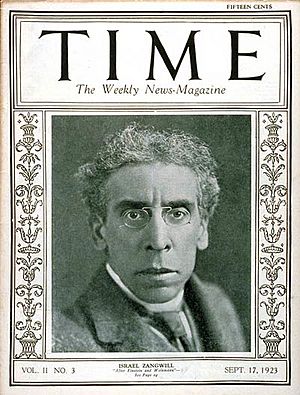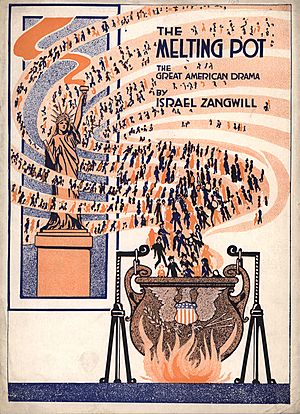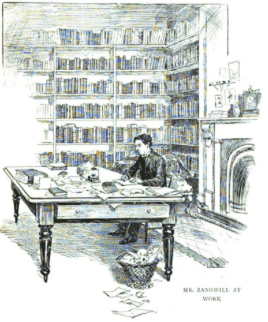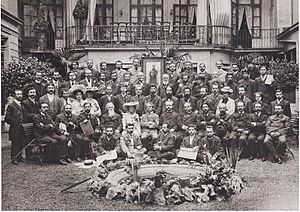Israel Zangwill facts for kids
Quick facts for kids
Israel Zangwill
|
|
|---|---|
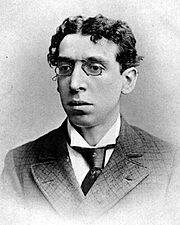 |
|
| Born | 21 January 1864 London, England, United Kingdom |
| Died | 1 August 1926 (aged 62) Midhurst, West Sussex, England, United Kingdom |
| Notable works | The Big Bow Mystery (1892) The Melting Pot (1908) |
| Spouse | Edith Ayrton |
| Signature | |
 |
|
Israel Zangwill (born January 21, 1864 – died August 1, 1926) was a British writer. He was a leading figure in a movement called cultural Zionism in the 1800s. This movement aimed to create a Jewish cultural center. Zangwill was also a close friend of Theodor Herzl, who was a key leader in the Zionist movement. Later, Zangwill changed his mind about finding a Jewish homeland in Palestine. He then became a main thinker behind the territorial movement, which looked for a Jewish homeland anywhere in the world.
Contents
Early Life and School
Israel Zangwill was born in London, England, on January 21, 1864. His family were Jewish immigrants from Lithuania, which was then part of the Russian Empire. His father came from what is now Latvia, and his mother from what is now Poland.
Zangwill spent his life supporting people he felt were treated unfairly. He cared about topics like Jewish emancipation (getting equal rights for Jewish people) and women's suffrage (the right for women to vote). His brother, Louis Zangwill, was also a novelist.
Zangwill first went to school in Plymouth and Bristol. When he was eight, his family moved to East London. He then attended the Jews' Free School, a school for Jewish immigrant children. This school provided strict lessons, clothing, food, and health care. Today, one of its houses is named Zangwill in his honor. He was an excellent student and even taught part-time there. Eventually, he became a full-time teacher.
While teaching, he also studied at the University of London. He earned his degree in 1884 with high honors.
Writing Career
Zangwill used different pen names for some of his writings. These included J. Freeman Bell, Countess von S., and Marshallik.
He wrote a story called The Premier and the Painter with Louis Cowen. After this, he left his teaching job due to disagreements with the school. He then started a career in journalism. He began and edited a magazine called Ariel, The London Puck. He also worked for other London newspapers.
Zangwill's writing style earned him the nickname "the Dickens of the Ghetto." He wrote a very important novel called Children of the Ghetto: A Study of a Peculiar People (1892). Another famous writer, George Gissing, called it "a powerful book."
Zangwill's play The Melting Pot became very popular in the United States in 1909–1910. This play made the phrase "melting pot" well-known. It describes how different immigrant groups in America blend together. The play explored issues like ethnic tensions and how different cultures mix in early 20th-century America.
When The Melting Pot opened in Washington D.C. in 1908, former President Theodore Roosevelt praised it. He shouted, "That's a great play, Mr. Zangwill. That's a great play!" In 1912, Roosevelt wrote to Zangwill, saying the play was a "very strong and real influence" on his thoughts and life.
The main character of the play is David Quixano. He is a Russian Jewish immigrant who comes to New York City after his family is killed in a violent attack. He writes a great symphony (a long musical piece) called "The Crucible." This music expresses his hope for a world where all ethnic differences disappear. He falls in love with a beautiful Russian Christian immigrant named Vera. The play's most dramatic moment is when David meets Vera's father. It turns out he was the Russian officer responsible for killing David's family. Vera's father admits his guilt. The symphony is performed to great applause. David and Vera decide to marry and kiss as the play ends.
The Melting Pot celebrated America's ability to welcome immigrants. It showed how America grew stronger from their contributions. Zangwill, as a Jewish writer, hoped for a world where racial and religious differences were no longer important.
However, the play also showed the difficulties when different ethnic groups meet. It showed tensions between Jewish and Christian communities. It also showed how immigrants struggled to find their place in a new country while keeping their own culture.
The Melting Pot connected with audiences because it captured the spirit of the American immigrant experience. It explored ideas of blending cultures, identity, and the chance for a united nation. The play helped people talk about multiculturalism and American identity. It remains an important work in American theater.
Zangwill wrote many other plays. These included Children of the Ghetto (1899), based on his own novel. He also wrote mystery novels, like The Big Bow Mystery (1892). This was one of the first "locked room mystery" novels. In these stories, a crime happens in a seemingly impossible way, like in a locked room. This book has been printed almost continuously since 1891. It has also been made into three movies.
He also wrote social satires, like The King of Schnorrers (1894). This was a picaresque novel, meaning it followed the adventures of a clever but often dishonest hero. His book Dreamers of the Ghetto (1898) included essays about famous Jewish figures like Baruch Spinoza and Heinrich Heine.
Political Views
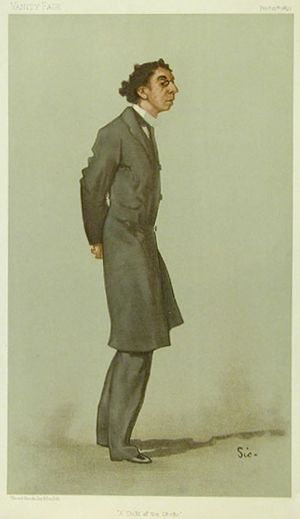
Zangwill as shown by Walter Sickert in Vanity Fair, February 1897.
Zangwill supported feminism (equal rights for women) and pacifism (the belief that war is wrong). But his biggest impact was in popularizing the idea of different ethnic groups combining into one American nation. The hero of his play The Melting Pot famously says: "America is God's Crucible, the great Melting-Pot where all the races of Europe are melting and reforming...Germans and Frenchmen, Irishmen and Englishmen, Jews and Russians – into the Crucible with you all! God is making the American."
Jewish Politics
Zangwill was also deeply involved in issues important to Jewish people. He supported assimilation (Jewish people blending into wider society). He was an early Zionist, supporting a Jewish homeland in Palestine. Later, he became a territorialist. Jewish territorialism was a political idea that came about because of rising anti-Jewish feelings in Europe. It suggested creating a Jewish homeland outside of Palestine. This offered another solution to the debate about Jewish self-rule and Zionism.
For a time, Zangwill supported Theodor Herzl and the main Zionist movement. But in 1905, Zangwill left this movement and started his own group, the Jewish Territorialist Organization. He believed a Jewish homeland could be found anywhere in the world. Ideas for this homeland included Canada, Australia, Mesopotamia, Uganda, and Cyrenaica (in modern-day Libya).
Zangwill is often incorrectly given credit for the saying "A land without a people for a people without a land." This phrase describes the idea of Zionists wanting a homeland in the Biblical land of Israel. However, he did not invent it. He said he borrowed it from Lord Shaftesbury. In 1853, Lord Shaftesbury wrote that Greater Syria was "a country without a nation" that needed "a nation without a country...the ancient and rightful lords of the soil, the Jews!"
In 1901, Zangwill wrote that "Palestine is a country without a people; the Jews are a people without a country."
However, within a few years, Zangwill realized that Palestine already had many Arab inhabitants. He told an audience in New York that the area was "already twice as thickly populated as the United States." This meant Zionists would either have to force the Arabs out or deal with a "large alien population." Because of this, he shifted his support to the Uganda scheme. This led to him breaking away from the main Zionist movement by 1905. In 1913, he criticized those who kept saying Palestine was "empty and derelict." He said they called him a traitor for reporting the truth.
According to Ze'ev Jabotinsky, Zangwill told him in 1916 that if you want to give a country to a people without a country, it's foolish to let it be the country of two peoples. This would only cause trouble for both groups.
In 1917, he wrote that Lord Shaftesbury was "literally inexact" in saying Palestine was a country without a people. He noted that the country held 600,000 Arabs.
Famous Sayings
Zangwill listed some of his most striking passages:
- What is, is right. If aught seem wrong below,/Then wrong It is — of thee to leave it so — Without Prejudice
- Art is truth seen as beauty —The Master
- Hunted from shore to shore through the ages they had found the national aspiration — peace — in a country where Passover came without menace of blood —Children of the Ghetto
- The Jewish mission will never be In-over till the Christians are converted to the religion of Christ —Dreamers of the Ghetto
- Each poor man Is a rung in the Jacob's ladder by which the rich man may, if he is charitable, mount to heaven—The King of Schnorrers
Other Views
Zangwill had mixed feelings about the territory of Palestine. This area later became the modern State of Israel in 1948, after his death. Some people thought the new state might have fulfilled his hopes.
He was an early supporter of women's right to vote.
During World War I, he suggested forming a Jewish foreign legion to fight for the Central Powers.
Zangwill also used the term "The League of Damnations." This phrase described the widespread anti-Jewish feelings in Europe during his time. He used his writings to show and challenge the unfair treatment faced by Jewish people.
Personal Life
Zangwill married Edith Ayrton in 1903. She was also a writer and a supporter of women's rights. Her stepmother was Hertha Ayrton, who was also Jewish.
The Zangwill family lived for many years in a house called Far End in East Preston, West Sussex. They had three children: two sons and a daughter. Their younger son, Oliver Zangwill, became a well-known British psychologist.
Israel Zangwill died from pneumonia on August 1, 1926. He passed away at a nursing home in Midhurst, West Sussex.
Other Works
- Chosen Peoples, (1919)
- The Big Bow Mystery (1892)
- The King of Schnorrers (1894)
- The Mantle of Elijah (London : Heinemann)
- The Master (1895) (based on the life of his friend and illustrator George Wylie Hutchinson)
- The Melting Pot (1909)
- The Old Maid’s Club (1892)
- The Bachelors' Club (London : Henry, 1891)
- The Serio-Comic Governess (1904)
- Without Prejudice (1896)
- Merely Mary Ann (1904)
- The Grey Wig: Stories and Novelettes (1903) which include The Grey Wig; Chasse-Croise; The Woman Beater; The Eternal Feminine; The Silent Sisters
- Italian Fantasies (1910)
As a translator:
- Selected Religious Poems of Solomon ibn Gabirol; pub. The Jewish Publication Society of America (1923)
The "of the Ghetto" books:
- Children of the Ghetto: A Study of a Peculiar People (1892)
- Grandchildren of the Ghetto (1892)
- Dreamers of the Ghetto (1898)
- Ghetto Tragedies, (1899)
- Ghetto Comedies, (1907)
Film Adaptations
Many of Zangwill's works were made into movies:
- Children of the Ghetto (film), directed by Frank Powell (1915, based on the play Children of the Ghetto)
- The Melting Pot, directed by Oliver D. Bailey and James Vincent (1915, based on the play The Melting Pot)
- Merely Mary Ann, directed by John G. Adolfi (1916, based on the play Merely Mary Ann)
- The Moment Before, directed by Robert G. Vignola (1916, based on the play The Moment of Death)
- Mary Ann, directed by Alexander Korda (Hungary, 1918, based on the play Merely Mary Ann)
- Nurse Marjorie, directed by William Desmond Taylor (1920, based on the play Nurse Marjorie)
- Merely Mary Ann, directed by Edward LeSaint (1920, based on the play Merely Mary Ann)
- The Bachelor's Club, directed by A. V. Bramble (1921, based on the novel We Moderns)
- We Moderns, directed by John Francis Dillon (1925, based on the play We Moderns)
- Too Much Money, directed by John Francis Dillon (1926, based on the play Too Much Money)
- Perfect Crime, directed by Bert Glennon (1928, based on the novel The Big Bow Mystery)
- Merely Mary Ann, directed by Henry King (1931, based on the play Merely Mary Ann)
- The Crime Doctor, directed by John S. Robertson (1934, based on the novel The Big Bow Mystery)
- The Verdict, directed by Don Siegel (1946, based on the novel The Big Bow Mystery)
Images for kids
See also
 In Spanish: Israel Zangwill para niños
In Spanish: Israel Zangwill para niños
 | Bessie Coleman |
 | Spann Watson |
 | Jill E. Brown |
 | Sherman W. White |


